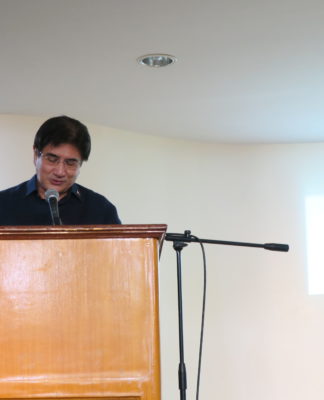 TEODORA “Doring” Agcang was standing by a street lamp on España Street when I first saw her. It was past midnight last June 6 and I was looking for a way back to my apartment on G. Tolentino Street, just a block away from P. Noval.
TEODORA “Doring” Agcang was standing by a street lamp on España Street when I first saw her. It was past midnight last June 6 and I was looking for a way back to my apartment on G. Tolentino Street, just a block away from P. Noval.
Walking alone from school was not a good idea so a friend suggested that I take a pedicab.
I hesitantly approached the old lady who was sitting inside a pedicab. At first, I assumed she was merely guarding it for someone else, probably her husband who had gone to the restroom. But after seeing my expectant face, she began to speak.
“Where are you headed?” she asked in Filipino.
I was surprised to find out that the pedicab was hers. I told her my destination and soon we were off.
She began to talk to me about her job as a pedicab driver as we made our way to the other side of the University. It must have been her habit to talk to passengers to stay alert at such late hours.
“I’ve been doing this for two years,” she said. “This is my first time to P.Noval. Most of my passengers have dorms in Moret, Vicente Cruz, or Legarda.”
At 57 and as a mother of five, Doring doesn’t look like anyone who would pedal for a living. To think that she also competes with much younger pedicab drivers who are mostly men.
“I’m the only woman there,” she said, laughing. “And to think that I’m so old.”
Doring lives in Cubao, Quezon City, and comes every day to Sampaloc to guard an empty lot for a family friend. When she started out, she saw pedicab drivers hanging around the streets around the University. She soon came up with the idea of driving one herself for extra money.
However, Rogelio, Doring’s husband and a fellow pedicab driver, initially did not want her to pedal because of the physical strain that came with the job. But Doring’s persistence soon won him over.
“I asked my husband for permission. We were also struggling with our budget back then so it’s good that he said yes,” she said.
Consequently, Doring’s husband began to fully support her when she got a pedicab of her own.
“When it’s windy, I have a hard time pedaling. That’s when my husband would come and push my pedicab from the back to help me,” she said.
Most of Doring’s passengers were students like me who went home late from UST. According to her, some of them even worried when she pedaled for them, often urging her to stop in the middle of the way to give her a chance to rest.
“They would ask me if I’m alright. Some of them even said they wanted me to stop driving my pedicab. They wanted me to do something else for a living,” she said.
Besides being a means to earn money for her family, pedaling is also Doring’s form of exercise. She said she was at the peak of her health because of her job. Not even a case of rheumatism is enough to make her stop and pursue less strenuous work.
“I feel that I get better by pedaling than when I lie down the whole day. When I stop pedaling and just stay inside our house, that’s when I get sick,” she said.
To check her health, Doring also makes it a point to spend a portion of her savings from her P400 daily income to see a doctor and buy medicine whenever she felt sick.
“I don’t feel that it’s a burden. I feel great when I pedal. I’ll keep on doing this for as long as I can,” she said, as we finally made to G.Tolentino.
When I got off the pedicab, I couldn’t help but ask Doring if I could take her picture. Bashfully, she agreed, as long as she didn’t smile. She forgot to wear her dentures that night.
After paying her, I took one last look at Doring and her pedicab as she followed a trail of street lamps back to España. Not unlike those street lamps, which were put up to guide pedestrians and keep them safe, she served as a guide and guard to me for a while that night.
I had a feeling she would be guiding more stranded souls for many more nights to come. R.L. Reyes

















